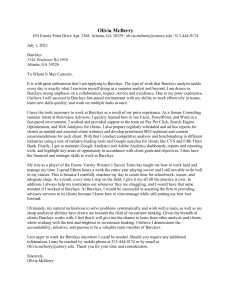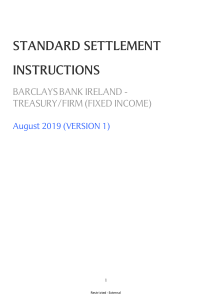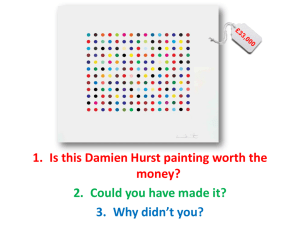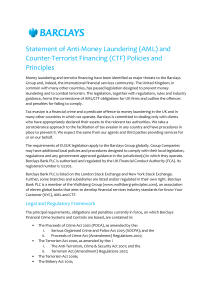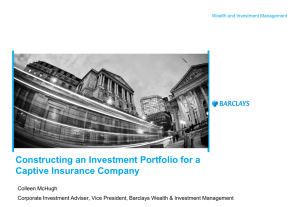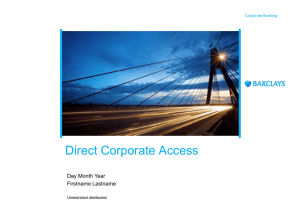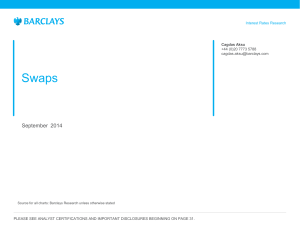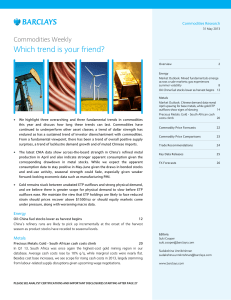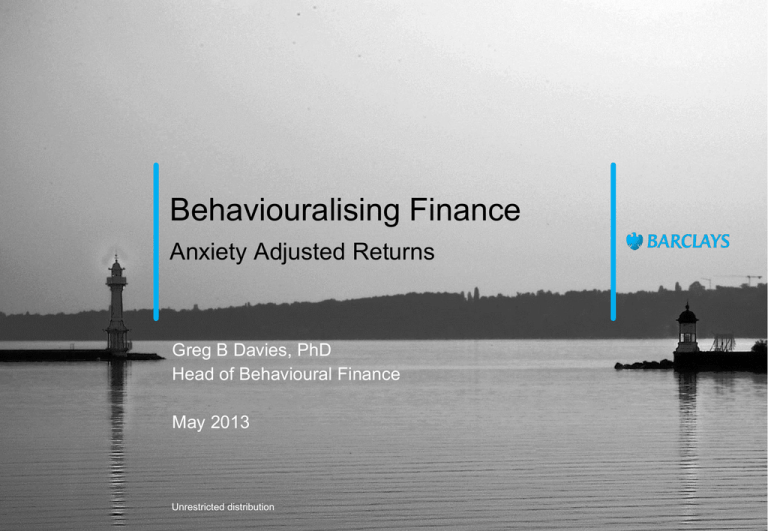
Behaviouralising Finance
Anxiety Adjusted Returns
Greg B Davies, PhD
Head of Behavioural Finance
May 2013
Unrestricted distribution
2
Sell date, quarterly 70
75
70
80
85
90
95
00
05
10
If you bought in 1975
and sold in 1995, your
average annual return
would have been 12%
Buy date, 75
quarterly
80
85
MSCI World
Equity
Annualised
Returns
90
95
00
05
Past performance is not a reliable indicator of future results
<-5%
-5% to
0%
0 to
5%
5 to
10%
10 to 15%
Source: MSCI World Index, 1970 - August 2011, Barclays Wealth
>15%
10
Sell date, quarterly 70
75
70
80
85
90
Buy date, 75
quarterly
95
00
05
10
No nominal losses over
any holding period of
12 years or more
80
85
MSCI World
Equity
Annualised
Returns
90
95
Zone of Anxiety
00
05
Past performance is not a reliable indicator of future results
<-5%
-5% to
0%
0 to
5%
5 to
10%
10 to 15%
Source: MSCI World Index, 1970 - August 2011, Barclays Wealth
>15%
10
The experience we should base decisions on
60%
40%
20%
0%
-20%
-40%
Framing horizon
Source: MSCI World Index, 1970 - August 2011, Barclays Wealth
Past performance is not a reliable indicator of future results
Dec-11
Dec-10
Dec-09
Dec-08
Dec-07
Dec-06
Dec-05
Dec-04
Dec-03
Dec-02
Dec-01
Dec-00
Dec-99
Dec-98
Dec-97
Dec-96
Dec-95
Dec-94
Dec-93
Dec-92
Dec-91
Dec-90
Dec-88
Dec-87
Dec-86
Dec-85
Dec-84
Dec-83
Dec-82
Dec-81
Dec-80
Dec-79
-80%
Dec-89
10 Years
-60%
The experience we do base decisions on
60%
40%
20%
0%
-20%
-40%
Framing horizon
1 Year
-60%
10 Years
Source: MSCI World Index, 1970 - August 2011, Barclays Wealth
Past performance is not a reliable indicator of future results
Dec-11
Dec-10
Dec-09
Dec-08
Dec-07
Dec-06
Dec-05
Dec-04
Dec-03
Dec-02
Dec-01
Dec-00
Dec-99
Dec-98
Dec-97
Dec-96
Dec-95
Dec-94
Dec-93
Dec-92
Dec-91
Dec-90
Dec-89
Dec-88
Dec-87
Dec-86
Dec-85
Dec-84
Dec-83
Dec-82
Dec-81
Dec-80
Dec-79
-80%
Modern Portfolio Theory – the standard model
Expected
Returns
Portfolio Efficient Frontier
Risk/Return Trade-off
(Indifference Curve)
7
A completely rational, risk-averse, investor…
Long-term Objectives
Utility
Perceived
Value
8
A completely rational, risk-averse, investor…
Short-term Biases
Perceived
Value
Losses (%)
9
Long-term Objectives
Utility
Gains (%)
Behaviour
Utility
Perceived
Value
Losses (%)
Gains (%)
Adding anxiety…
Short-term Biases
Perceived
Value
Losses (%)
10
Long-term Objectives
Utility
Gains (%)
Behaviour
Utility
Perceived
Value
Losses (%)
Gains (%)
Anxiety leads investors to reject beneficial investments
Risk plus Anxiety
Compensation
Expected
Returns
Accept
Falsely
Reject
Risk
Compensation
Anxiety
Compensation
Reject
Risk free
return
Risk
12
DESIRE FOR DELEGATION
DESIRE FOR DELEGATION
BELIEF IN SKILL
PERCEIVED FINANCIAL EXPERTISE
PERCEIVED FINANCIAL EXPERTISE
Risk Attitudes
BELIEF IN SKILL
MARKET ENGAGEMENT
MARKET ENGAGEMENT
COMPOSURE
RISK TOLERANCE
RISK TOLERANCE
COMPOSURE
Mr. Jones
Mrs. Jones
Fine-tuning the individual solution
Decision Style
Moderate Risk Tolerance
?
?
Portfolio Return
Buy emotional comfort the easy (and expensive) way
Time
13
Portfolio Return
Buy emotional comfort the easy (and expensive) way
Reluctance
Time
14
Portfolio Return
The journey matters!
Danger of buying high
Danger of selling low
Behaviour
Gap
Time
15
Portfolio Return
The journey matters!
Buying Emotional Insurance through Smoothing
Emotional
Insurance
Behaviour
Gap
Time
16
Maximising Anxiety Adjusted Returns
Expected
Returns
Portfolio Efficient Frontier
17
Contact Details
greg.davies2@barclays.com
@GregBDavies
InvestmentPhilosophy.net
Unrestricted distribution
Portfolio Return
Which investor is happiest at the end?
A)
B)
C)
D)
Blue line
Black line
Orange line
None/all
Time
19
20
BELIEF IN SKILL
DESIRE FOR DELEGATION
DESIRE FOR DELEGATION
Risk Attitudes
BELIEF IN SKILL
PERCEIVED FINANCIAL EXPERTISE
PERCEIVED FINANCIAL EXPERTISE
COMPOSURE
COMPOSURE
MARKET ENGAGEMENT
RISK TOLERANCE
RISK TOLERANCE
MARKET ENGAGEMENT
Mr. Jones
Mrs. Jones
The traditional asset allocation solution
Decision Style
Moderate Risk Tolerance
Cycle of investment emotions
Exuberance
Excitement
Denial
Optimism
Fear
Reluctance
Reluctance
Desperation
Panic
Capitulation
Indifference
Apathy
Depression
Despondency
21
Reluctance: waiting for the right moment
Cumulative Returns - Indexed
250
200
150
100
50
0
Jan-02
Jan-04
Jan-06
SAA RP3
Source: FactSet, Bloomberg, Merrill Lynch and Barclays.
22
Jan-08
Jan-10
3M LIBOR
Jan-12
Reducing anxiety
Category
Reluctance
Behaviour Gap
+
+
-+
+
+++
++
+
+
+++
++
Discretionary management
+
+++
Involvement
Advice
+
+
Trading-off efficiency
Reduce information frequency/detail
Increase liquidity
Familiarity bias
Deliberate action bias
Active versus passive
+
+
++
+
+
++
+
+
+
+
Strategic versus tactical
+
+++
+
+++
Education
Constraints
Risk targeting
Management style
Investing framework
23
Action
Lock in to low liquidity assets
Reduce Risk
Smoothing
Downside defence
Phased investment
Financial framing – instability of risk preferences
Imagine you bought $6,000 worth of stock from a now bankrupt company
There are two alternatives to recover money…
Would you choose A or B?
Alternative A
Recover $2,000
Alternative X
Lose $4,000
Alternative B
1/3 chance $6,000 recovered
2/3 nothing recovered
Alternative Y
1/3 chance nothing lost
2/3 chance $6,000 lost
92% go for A
Source: Wang, 1996
24
24
Would you choose X or Y?
67% go for X
25
Disclaimer
This document has been issued and approved by Barclays Bank PLC. Although information in this document has been obtained from sources believed to be reliable, we do not
represent or warrant its accuracy, and such information may be incomplete or condensed. This document does not constitute a prospectus, offer, invitation or solicitation to buy
or sell securities and is not intended to provide the sole basis for any evaluation of the securities or any other instrument, which may be discussed in it. All estimates and
opinions included in this document constitute our judgement as of the date of the document and may be subject to change without notice. This document is not a personal
recommendation and you should consider whether you can rely upon any opinion or statement contained in this document without seeking further advice tailored for your own
circumstances. This document is confidential and is being submitted to selected recipients only. It may not be reproduced or disclosed (in whole or in part) to any other person
without our prior written permission. Law or regulation in certain countries may restrict the manner of distribution of this document and persons who come into possession of this
document are required to inform themselves of and observe such restrictions. We or our affiliates may have acted upon or have made use of material in this document prior to its
publication. You should seek advice concerning any impact this investment may have on your personal tax position from your own tax adviser.
Barclays offers wealth and investment management products and services to its clients through Barclays Bank PLC and its subsidiary companies.Barclays Bank PLC is
registered in England and authorised and regulated by the Financial Services Authority. Registered number is 1026167 and its registered office is 1 Churchill Place, London
E14 5HP.
© Barclays Bank PLC 2012. All rights reserved. Issued for companies including Barclays Bank PLC (Reg. No. 1026167), Barclays Stockbrokers Limited (Reg. No. 1986161), a
member of the London Stock Exchange and PLUS, Barclays Sharedealing (Reg. No. 2092410), Barclays Bank Trust Company Limited (Reg. No. 920880) and Gerrard
Investment Management Limited (Reg No. 2752982), a member of the London Stock Exchange. All of these companies are registered in England and have their registered
office at: 1 Churchill Place, London E14 5HP. All of these firms are authorised and regulated by the Financial Services Authority.

